Woody vines — like the ones in a Tarzan film — dangled from the canopy as we hiked up the bog, the soles of our boots caking with mud on each step.
Adventures in central Africa’s rainforests are not known for cleanliness, but trekking up the sloppy foothills of the Virunga volcanoes — with the heat, humidity and bugs — was well worth the effort. At the end of this morning hike in northern Rwanda, we were rewarded with the presence of a family of mountain gorillas.
Our guide gave our group an hour to observe and document the family of apes, which was unlike any animal encounter one might have with dogs, cats or even elephants. Gorillas share about 98% of DNA with humans, after all, and that common biochemistry means each individual in the ape family exhibits humanlike facial expressions and behaviors.
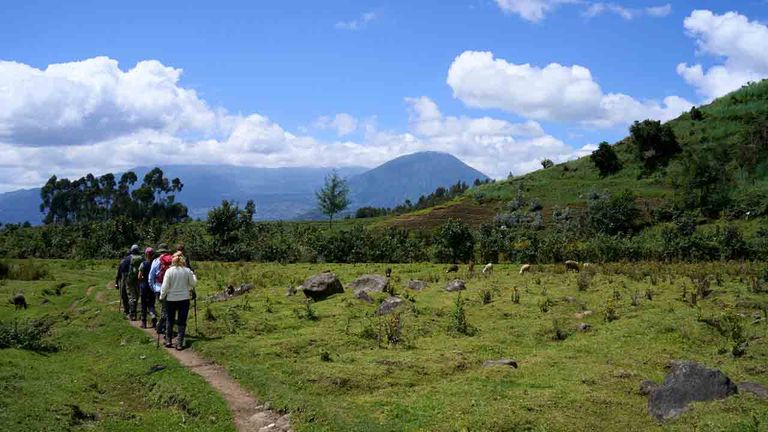 A group of travelers hike to see gorillas in Volcanoes National Park.
A group of travelers hike to see gorillas in Volcanoes National Park.
Credit: 2023 Adrian Solumsmo/stock.adobe.com
In our presence, a few hungry gorillas nonchalantly hung out in the trees, eating the leaves off branches — a late breakfast. Right in front of us, a young gorilla twirled in circles until he was dizzy, then wrestled playfully with his friends. Meanwhile, the silverback male — the patriarch of the group — posed authoritatively, until he got tired and took a nap. Gorillas, like humans on Thanksgiving, love post-meal naps.
But perhaps the most humanlike behavior we observed was mothers caring for their babies, carrying them and nurturing them as they awkwardly attempted to balance themselves upright. Each failed attempt was cuter than the previous one.
For most people, gorilla trekking in Rwanda’s Volcanoes National Park is a once-in-a-lifetime experience — especially when permits cost a whopping $1,500 per person. Yet it remains the main draw for Rwanda tourism. There’s just something wondrous about looking into the eyes of a wild mountain gorilla that can’t be simulated by a visit to a local zoo, or even to the Ellen DeGeneres Campus of the Dian Fossey Gorilla Fund, which lies down the road from the entrance of Volcanoes National Park.
These special primate-to-primate encounters are invaluable and unquestionably worth the journey to the East African nation; however, with the long flight time to Rwanda from the U.S. (basically an entire day), clients should also take advantage of other experiences the country has to offer.
Kigali
Any trip to Rwanda will inevitably pass through Kigali, its capital and the site of the international airport. For most visitors, Kigali is the gateway to this African nation — and what a first impression the city gives: Immediately noticeable is its overall cleanliness (partly resulting from a nationwide ban on plastic bags), which is complemented by the orderly traffic of motorcycle taxis.
Corporate buildings, boutique hotels such as The Retreat,a modern convention center and international restaurants thrive in Kigali — evidence of Rwanda’s stable and growing economy — but the structures don’t create a sprawling urban eyesore. Here, even in the capital, the rolling topography of the entire country dominates the landscape, so much so that Rwanda’s nickname is “land of a thousand hills.”
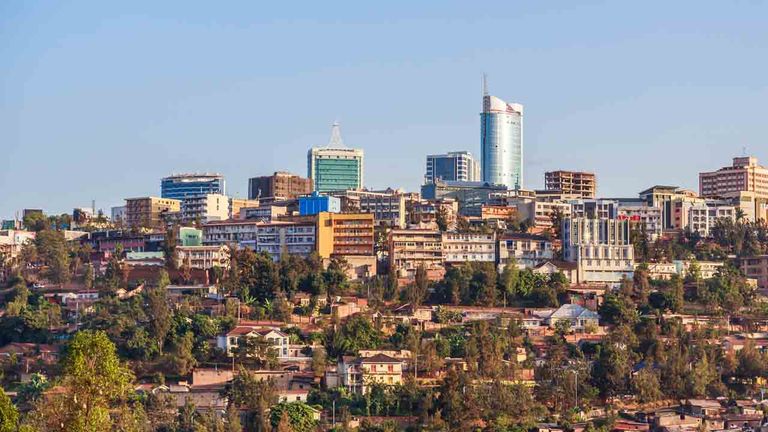 Kigali is the capital of Rwanda.
Kigali is the capital of Rwanda.
Credit: 2023 vadim.nefedov/stock.adobe.comRwanda has become what some consider a progressive African nation, not just environmentally and economically, but also socially and politically. It has completely rebuilt and reinvented itself after the darkest period of its history, when the nation was torn apart by a civil war that exploded into the 1994 genocide. Three decades later, there’s not much evidence of that history in day-to-day life, except for the Kigali Genocide Memorial, a necessary stop for any first-timer to Rwanda.
It’s home to a comprehensive and interactive exhibition on the Rwandan genocide, from its origins to its repercussions. On-site, there are also mass graves for the hundreds of thousands who perished, plus interpretive gardens and flowers to commemorate them. About a 5-minute drive south is Hotel des Mille Collines ("hotel of a thousand hills”), the property that served as a sanctuary in 1994 — popularized by the 2004 film “Hotel Rwanda” starring Don Cheadle — although it, too, has moved on from its past and is now more or less just one of the many luxury hotel offerings in the city.
Nyungwe National Park
As mountain gorillas are the main attraction in Rwanda, many people go north from Kigali to Volcanoes National Park. But gorillas aren’t the only monkeys around: In southwest Rwanda, in the mountain rainforest that extends beyond the border and into neighboring Burundi, lies Nyungwe National Park, known for its abundance of primates, including golden monkeys, colobus monkeys and endemic, white-bearded L’Hoest’s monkeys. There are also opportunities to go chimpanzee trekking; in a similar fashion to gorilla trekking (except much cheaper at just $90), guides and trackers lead clients to chimps for an intimate observation session with them.
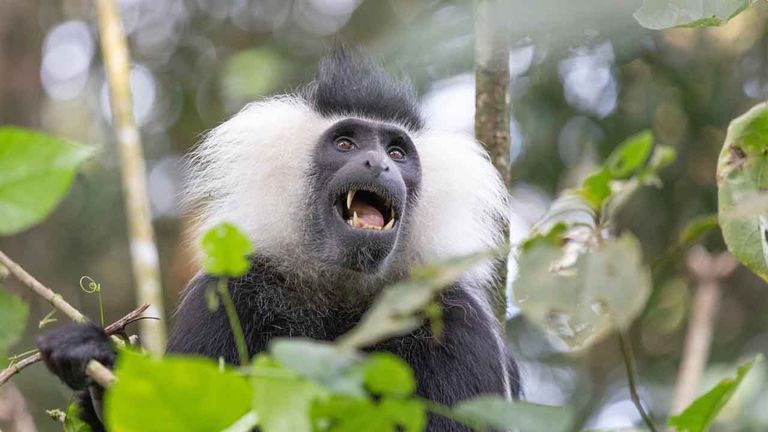 Colobus monkeys are just one of the primates living in Nyungwe National Park.
Colobus monkeys are just one of the primates living in Nyungwe National Park.
Credit: 2023 Ondrej/stock.adobe.comIf travelers have had their fill of primates, there’s plenty of other fauna and flora to occupy their attention. Nyungwe’s primal rainforest holds more than 1,000 plant species — 140 of them are orchids — and it’s also home to serval cats, mongooses, clawless otters and the elusive leopard. There are also 120 species of butterflies flying above and around the park’s network of hiking trails, including the relatively easy Igishigishigi Trail that brings hikers over a valley via a hanging canopy walking bridge. From that vantage point, guests can spy some of the park's 300-plus bird species.
Nearby the park entrance are many tea plantations, including Gisakura Tea Estate; a visit can be arranged through a local tour operator.
Akagera National Park
Most people associate primates with Rwandan wildlife, but in the savannah of Akagera National Park, which lies on the border of Rwanda and Tanzania, there are also lions, elephants, warthogs, giraffes, baboons and even white rhinos — animals typically associated with safaris in Kenya or Tanzania. Sightings happen in traditional safari fashion: riding in 4x4s during game drives on the designated roads throughout the park. Although it is possible to self-drive with a rental vehicle, it’s not suggested, so recommend that clients book with a local safari operator.
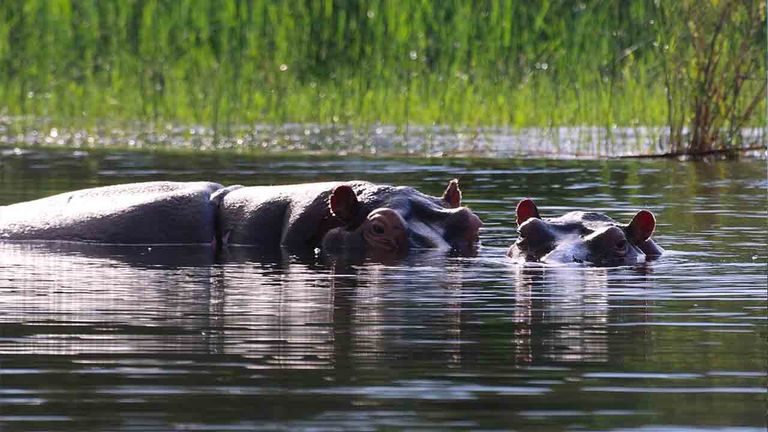 On safari in Akagera National Park
On safari in Akagera National Park
Credit: 2023 Erik TrinidadParts of Akagera lie on the shore of Lake Ihema, where visitors can take boat tours for sportfishing or for game cruises that get them (and their camera lenses) closer to hippos, crocodiles and nearly 500 species of birds that gather on the little islands. Boats can be arranged by local tour operators, by the safari lodges found outside the park entrance or by Mantis Akagera Game Lodge, the only luxury property within the park.
Lake Kivu
Even with primate trekking and big game safaris at the top of the must-do list, not everything on a Rwanda trip needs to be about animals; sometimes, it’s about relaxing on the beach with a cocktail. Lake Ihema and its surrounding mountains may provide stunning sunrise views in the east, but in the west, on the border with the Democratic Republic of the Congo, lies Rwanda’s largest lake. Lake Kivu is spectacular for sunsets — and corresponding sundowners on the beach.
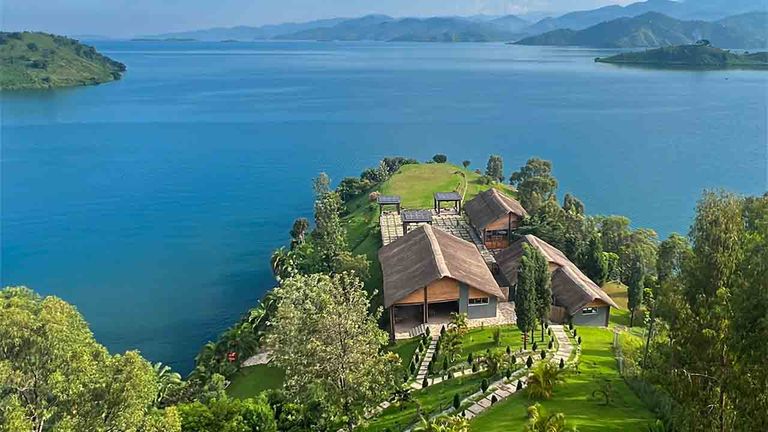 Cleo Lake Kivu is located on Rwanda’s largest lake.
Cleo Lake Kivu is located on Rwanda’s largest lake.
Credit: 2023 Erik TrinidadEnergy companies have embraced Lake Kivu for the presence of natural gas beneath its surface, but tourists need not worry about rumors that the paradisiacal lake is explosive; the gasses are found very deep underwater. In fact, it’s one of Africa’s deepest lakes. That said, there aren’t any hippos or crocodiles — they only inhabit shallow waters — which makes Lake Kivu the perfect setting for those who desire a beach vacation within a landlocked country.
There are plenty of lakeside accommodations catering to every budget, ranging from guesthouses to luxury resorts. On the northern end of the lake in Gisenyi, one of the main gateway towns, there’s the modest Paradise Malahide, as well as the higher-end Lake Kivu Serena Hotel. On the southern end in Cyangugu, there's Mantis Kivu Marina Bay Hotel with similar Western luxury amenities. Halfway between the two is a standout luxury hotel in Kibuye: Cleo Lake Kivu, proudly owned and operated by Rwandans. It’s situated on a hill, offering elevated views of the lake and sunsets.
Clients looking for a lake excursion need only to turn to their hotel concierge or a local tour operator. Suggest they set up a unique Lake Kivu experience: excursions with the local singing fishermen, who fish at night using lights to attract fish — and sing to keep their spirits up. For those who prefer to stay on land, many coffee plantations along the lake offer the opportunity to learn about Rwandan coffee. Adventure-seekers, meanwhile, may enjoy renting a mountain bike and riding a section of The Congo Nile Trail, a 141-mile multipurpose trail that spans most of the length of Lake Kivu, from Gisenyi to Cyangugu.